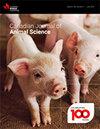日粮添加多种酶的肉鸡与艾美耳球虫感染相关的肠道动力学和微生物组、生长性能和营养利用
IF 1
4区 农林科学
Q3 AGRICULTURE, DAIRY & ANIMAL SCIENCE
引用次数: 0
摘要
摘要球虫病是一种传染性寄生虫病。耐药性的增加和疫苗有效性的变化激发了人们对开发替代控制策略的兴趣。我们的研究通过评估(i)小肠的营养利用、免疫反应和肠道健康指标,研究了日粮中添加多种酶(植酸酶、木聚糖酶、β-葡聚糖酶、淀粉酶、半纤维素酶和果胶酶)对感染球虫病原体的肉鸡的影响;和(ii)肠道微生物组调节。一天大的雄性Ross 708雏鸡被分配到4个处理中,以2×2的因子安排,包括0或50 g·kg−1多酶和用磷酸盐缓冲盐水或混合艾美耳球虫进行口服攻击。卵囊(250000 E.acervulina、50000 E.maxima和50000 E.tenella)。多酶降低了(P<0.05)艾美耳球虫引起的饲料效率和养分利用率的损失,部分原因是空肠中b0,+氨基酸转运蛋白的减少。多酶抑制(P<0.05)十二指肠和空肠中白细胞介素-8的过度表达,并改善(P=0.05)由艾美耳球虫感染引起的回肠中抗氧化血红素加氧酶1的表达降低。多酶促进了短链脂肪酸产生菌和纤维降解菌的繁殖(P<0.01)。多酶补充通过多种机制部分减轻了艾美耳球虫感染的不良影响:提高营养利用率、减少局部炎症和恢复微生物稳态。本文章由计算机程序翻译,如有差异,请以英文原文为准。
Eimeria infection-related intestinal dynamics and microbiome, growth performance, and nutrient utilization in broiler chickens fed diets supplemented with multienzyme
Abstract Coccidiosis is an infectious parasitic disease. Increasing drug resistance and variable vaccine effectiveness have stimulated interests in developing alternate control strategies. Our research studied the effects of dietary supplementation of multienzyme (phytase, xylanase, β-glucanase, amylase, hemicellulase, and pectinase) in broiler chickens infected with coccidial pathogens by assessing (i) nutrient utilization, immunological response, and gut health-related indicators in small intestine; and (ii) intestinal microbiome modulations. One-day-old male Ross 708 chicks were assigned to 4 treatments in a 2 × 2 factorial arrangement comprising of 0 or 50 g·kg−1 multienzyme and oral challenge with phosphate buffer saline or mixed Eimeria spp. oocysts (250000 E. acervulina, 50000 E. maxima, and 50000 E. tenella). Multienzyme reduced (P < 0.05) Eimeria-induced loss in feed efficiency and nutrient utilization, partially explained by reduced decrease of b0,+ amino acid transporter in jejunum. Multienzyme suppressed (P < 0.05) the overexpression of interleukin-8 in duodenum and jejunum and ameliorated (P = 0.05) the decreased expression of antioxidant heme oxygenase 1 in ileum induced by Eimeria infection. Multienzyme facilitated (P < 0.01) the bloom of short-chain fatty acid-producing and fiber-degrading microbes. Multienzyme supplementation partly mitigated the adverse effects of Eimeria infection through multiple mechanisms: improving nutrient utilization, reducing local inflammation, and restoring microbial homeostasis.
求助全文
通过发布文献求助,成功后即可免费获取论文全文。
去求助
来源期刊

Canadian Journal of Animal Science
农林科学-奶制品与动物科学
CiteScore
2.30
自引率
0.00%
发文量
51
审稿时长
6 months
期刊介绍:
Published since 1957, this quarterly journal contains new research on all aspects of animal agriculture and animal products, including breeding and genetics; cellular and molecular biology; growth and development; meat science; modelling animal systems; physiology and endocrinology; ruminant nutrition; non-ruminant nutrition; and welfare, behaviour, and management. It also publishes reviews, letters to the editor, abstracts of technical papers presented at the annual meeting of the Canadian Society of Animal Science, and occasionally conference proceedings.
 求助内容:
求助内容: 应助结果提醒方式:
应助结果提醒方式:


